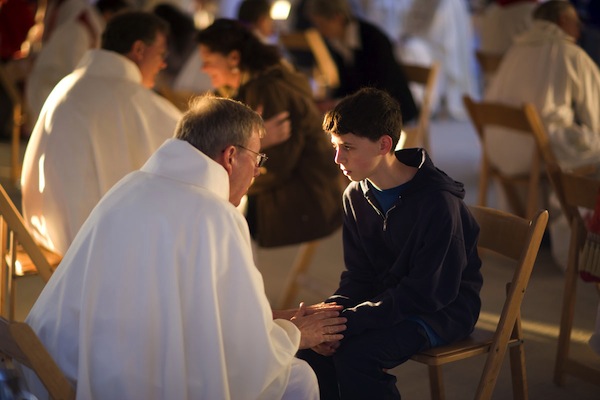Reconciliation
 This sacrament is rooted in the mission God gave to Christ in his capacity as the Son of man on earth to go and forgive sins (cf. Matt. 9:6). Thus, the crowds who witnessed this power "glorified God, who had given such authority to men" (Matt. 9:8).
This sacrament is rooted in the mission God gave to Christ in his capacity as the Son of man on earth to go and forgive sins (cf. Matt. 9:6). Thus, the crowds who witnessed this power "glorified God, who had given such authority to men" (Matt. 9:8).
After his resurrection, Jesus passed on his mission to forgive sins to his ministers, telling them, "As the Father has sent me, even so I send you... Receive the Holy Spirit. If you forgive the sins of any, they are forgiven; if you retain the sins of any, they are retained" (John 20:21-23).
"Christ instituted the sacrament of Penance for all sinful members of his Church: above all for those who, since Baptism, have fallen into grave sin, and have lost their baptismal grace and wounded ecclesial communion. It is to them the sacrament of Penance offers a new possibility to convert and to recover the grace of justification. The Fathers of the Church present this sacrament as 'the second plank [of salvation] after the shipwreck which is the loss of grace.'"
Catechism of the Catholic Church no. 1447
Rite of Reconciliation
Reconciliation may be face-to-face or anonymous, with a screen between you and the priest.
1. Begin with an examination of conscience (See below)
2. The priest gives you a blessing or greeting. He may share a brief Scripture passage.
3. Make the Sign of the Cross and say: "Bless me father, for I have sinned. My last confession was..." (give the number of weeks, months, or years).
4. Confess all your sins to the priest. The priest will help you make a good confession. If you are unsure about how to confess or you feel uneasy, just ask him to help you. Answer his questions without hiding anything out of fear or shame. Place your trust in God, a merciful Father who wants to forgive you.
5. Following your confession of sins, say: "I am sorry for these and all of my sins."
6. The priest assigns you a penance and offers advice.
7. Say an Act of Contrition, expressing your sorrow for your sins. The priest, acting in the person of Christ, then absolves you from your sins.
Worried about Reconciliation?
It's normal to have some concerns. Perhaps you're worried you might forget how to go to confession, especially if you haven't gone in several years. The priest is there to guide you through it. Maybe you're worried because you're really embarassed or ashamed of one of your sins. We all are, and that's a sign of your conscience telling you it was wrong. It is good to talk to someone about it and bring it up, so that it can be healed. A hidden wound can never be cured. Are you worried that the priest might judge you, remember your sins, or tell someone? Confession is a place of mercy, not judgment. The priest has heard just about everything before, and there are no "new sins." He will not remember your sins. Plus, the confessional is completely private--the priest cannot reveal what you said to anyone, not even in a court of law! If he tells anyone, he actually gets kicked out of the Catholic Church!
Confession is God's gift to give you mercy. Open yourself to him, and be healed. Take advantage of the sacrament on a regularly basis, and God will continue to pour out His grace to help you be stronger in times of temptation.


